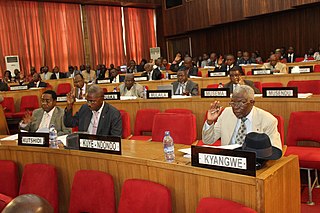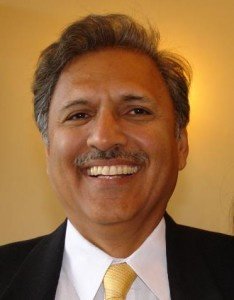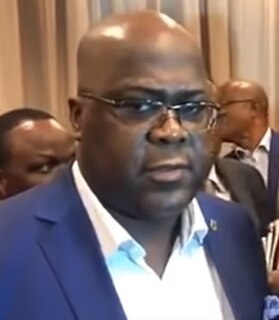
Politics of the Democratic Republic of Congo take place in a framework of a republic in transition from a civil war to a semi-presidential republic.

The Parliament of Pakistan is the federal and supreme legislative body of Pakistan. It is a bicameral federal legislature that consists of the Senate as the upper house and the National Assembly, as the lower house. According to the constitution of Islamic Republic of Pakistan, the President of Pakistan is also a component of the Parliament. The National Assembly is elected for a five-year term on the basis of adult franchise and one-man one-vote. The tenure of a Member of the National Assembly is for the duration of the house, or sooner, in case the Member dies or resigns. The tenure of the National Assembly also comes to an end if dissolved on the advice of the Prime Minister or by the president in his discretion under the Constitution.
The Pan-African Union for Social Democracy is a political party in the Republic of the Congo headed by Pascal Lissouba, who was President from 1992 to 1997. It has been the country's main opposition party since Lissouba's ouster in 1997. Pascal Tsaty-Mabiala has been Secretary-General of UPADS since 2006.

This article gives information on elections in Afghanistan.

Elections in Gabon take place within the framework of a presidential multi-party democracy with the Gabonese Democratic Party, in power since independence, as the dominant party. The President and National Assembly are directly elected, whilst the Senate is indirectly elected.

Philippine elections are of several types. The president, vice-president, and the senators are elected for a six-year term, while the members of the House of Representatives, governors, vice-governors, members of the Sangguniang Panlalawigan, mayors, vice-mayors, members of the Sangguniang Panlungsod/members of the Sangguniang Bayan, barangay officials, and the members of the Sangguniang Kabataan are elected to serve for a three-year term.

Since its establishment in 1947, Pakistan has had an asymmetric federal government and is a federal parliamentary democratic republic. At the national level, the people of Pakistan elect a bicameral legislature, the Parliament of Pakistan. The parliament consists of a lower house called the National Assembly, which is elected directly, and an upper house called the Senate, whose members are chosen by elected provincial legislators. The head of government, the Prime Minister, is elected by the majority members of the National Assembly and the head of state, the President, is elected by the Electoral College, which consists of both houses of Parliament together with the four provincial assemblies. In addition to the national parliament and the provincial assemblies, Pakistan also has more than five thousand elected local governments.

Elections in Rwanda take place within the framework of a multi-party democracy and a presidential system. The President and majority of members of the Chamber of Deputies are directly elected, whilst the Senate is indirectly elected and partly appointed.
The Movement for the Liberation of the Congo is a political party in Democratic Republic of the Congo. It was a rebel group operating in the Democratic Republic of Congo that fought the government throughout the Second Congo War. It subsequently took part in the transitional government and is one of the main opposition parties.

The Senate is the upper house of the Parliament of the Democratic Republic of the Congo.

Gubernatorial elections were held in the Democratic Republic of the Congo on 27 January 2007, though they were originally scheduled for 16 January and 19 January. The governors and vice-governors were chosen through indirect election by the members of the provincial assemblies; the delay was a result of the difficulties in choosing traditional chiefs to fill the places reserved for them in the provincial assemblies. The second round of voting would only have been necessary in those cases where no candidate had received an absolute majority in the first round, which was not the case anywhere. However, voting was rescheduled in Kasai-Occidental and Kasai-Oriental on 10 February to 15 February, because the Union of the Nation candidates were disqualified because they held dual citizenship.
The Forces for Renewal is a political party in the Democratic Republic of Congo. The party originated as a breakaway faction of the rebel Rally for Congolese Democracy (RCD) and was previously known as the RCD-Kisangani-Movement for Liberation.
Antipas Mbusa Nyamwisi is a politician and former rebel leader in the Democratic Republic of the Congo. He leads the Forces for Renewal political party and was Minister of Decentralization and Urban and Regional Planning until September 2011 when he resigned to run for president. He was previously the Minister of Foreign Affairs from 2007 to 2008.
The Union for the Nation is a Congolese electoral bloc formed by over 50 opposition supporters of Jean-Pierre Bemba, who was the major candidate in the 2006 presidential election and succeeding run-off against Joseph Kabila and is now a member of the Senate.

Presidential and parliamentary elections were held in Democratic Republic of the Congo on 28 November 2011; a facultative run-off on 26 February 2012 was shelved with a change in election laws.

Elections were held in the Democratic Republic of the Congo for 108 seats of the country's Senate on 14 March 2019. Former DRC President Joseph Kabila, who stepped down from office in January 2019 following the inauguration of the recently elected Félix Tshisekedi, has also joined the upper house of the legislature as a senator for life, for a total of 109 seats.

On 19 January 2015, protests led by students at the University of Kinshasa broke out in the Democratic Republic of the Congo. The protests began following the announcement of a proposed law that would allow the country's 43-year-old president, Joseph Kabila, to remain in power until a national census could be conducted. Elections had been planned for 2016 and a census would be a massive undertaking that would likely take several years for the developing country.

Senate elections were held in Pakistan on 5 March 2015 to elect the replacements for 52 retiring senators. Those retiring include chairman Nayyar Hussain Bukhari and deputy chairman Sabir Ali Baloch of the upper house. Pakistan Peoples Party (PPP), the majority party in Senate, would lose 21 members, followed by Pakistan Muslim League Nawaz would lose 9 and Awami National Party would lose 6 members.

Presidential elections were held in Pakistan on 4 September 2018.

General elections were held in the Democratic Republic of the Congo on 30 December 2018, to determine a successor to President Joseph Kabila, as well as for the 500 seats of the National Assembly and 715 provincial council seats. It was announced on 10 January 2019 that Félix Tshisekedi (UDPS) won with 38.6% of the vote, defeating another opposition candidate, Martin Fayulu, and Emmanuel Ramazani Shadary, backed by the ruling party PPRD. Fayulu alleged that the vote was rigged against him in a deal made by Tshisekedi and outgoing President Kabila, challenging the result in the DRC's Constitutional Court. Different election observers, including those from the country's Roman Catholic Church, also cast doubt on the official result. Nonetheless on 20 January the Court rejected his appeal and declared Tshisekedi as the winner. Parties supporting President Kabila won the majority of seats in the National Assembly. Félix Tshisekedi was sworn in as the 5th President of the Democratic Republic of the Congo on 24 January 2019, making it the first peaceful transition of power in the country since it became independent from Belgium in 1960.














